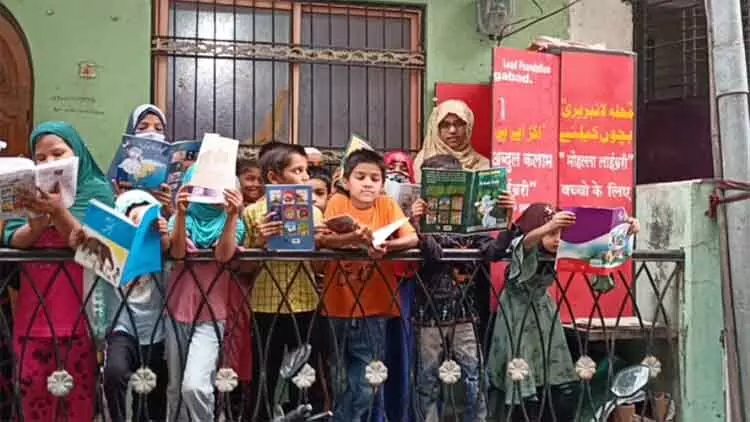
Mohalla Library Revolution: A Daughter and Father's Journey in Aurangabad, Maharashtra
Maryam Mirza and her father, Mirza Abdul Qayyum Nadvi, started their first mohalla library in Aurangabad, Maharashtra, with 300 books during the COVID-19 lockdown. Expanding to 31 libraries in 14 months, supported by community donations and managed by children, their initiative promotes reading among local kids, earning significant recognition for their efforts.
Mohalla Library Revolution:
A Daughter and Father's Journey in Aurangabad, MaharashtraMaryam Mirza began her library venture with 150 books, later expanding it with an additional 150 borrowed from her father, Mirza Abdul Qayyum Nadvi. Together, they launched their inaugural mohalla library for children from the balcony of their home in Baijipura, Aurangabad city, Maharashtra. Their modest setup, housed in a second-hand almirah, bore the name of India's 11th president, Dr. APJ Abdul Kalam.
Importance of reading
“Books and doors are the same thing. You open them, and you enter another world.
-Jeanette Winterson
Reading is the gateway to endless possibilities and knowledge. It fuels the imagination, broadens perspectives, and enhances critical thinking skills. We can explore different cultures, travel far-off lands, and empathize with diverse characters through books. It strengthens vocabulary and language proficiency, empowering effective communication. Moreover, reading fosters a lifelong love for learning, encouraging personal growth and intellectual curiosity. In a world of information, reading discerningly is indispensable for navigating complexities and making informed decisions.
Gone are the days when a library existed in most neighborhoods, renting out bestsellers and magazines at an affordable charge. It would not be incorrect to say that most of us have picked up the habit of reading not only because of the variety of available books but also because it never burned a hole in our pocket. A good novel cost between Rs. 150 to Rs. 250 in those days, and buying book after book was not feasible for voracious readers.
So whoever thought of the concept of a book library was a genius!
However, with the advent and subsequent takeover of the electronic age and internet era, readers have turned to buying books online, and several have moved towards eBooks and audiobooks. While eBooks and audiobooks are not cheaper compared to hard copies, one no longer finds a neighborhood library to rent books from.
So, what inspired Maryam and her father?
Inception of a dream
Four years ago, during the COVID-19 pandemic-induced lockdown in India, school-going children found themselves idle, with no access to schools, books, or homework.
"My daughter Maryam has an insatiable passion for reading," her father shared. "We own a small bookshop where she often comes to take books that pique her interest. Prior to the lockdown, Maryam had amassed a collection of approximately 150 books. With everything closed, including schools, children from our neighbourhood would often visit Mariam to borrow books."
When Maryam saw her books being taken away so frequently, she approached her father, Mirza Abdul Qayyum, who runs the Mirza World Book House bookstore, to open a library only for children.
Mirza, a reader himself, was intrigued by his daughter's initiative but struggled to secure adequate funding.
"I conveyed to her [Maryam] the necessity of acquiring a suitable space, furnishing it appropriately, and ensuring sufficient financial resources," recounted Mirza. "Yet, undeterred by these considerations, Maryam remained resolute in her determination." Subsequently, they went to a local bazaar to purchase a used almirah from a scrap dealer.
“On 14th November, 2020, with a total of 300 books, we started the library that Mariam wanted,” he added.
Expansion, Influence, and Community Support
Mirza is part of the Read and Learn Foundation (RLF), which promotes reading habits, particularly among children. The library was seen as aligning with the foundation's broader goals and ambitions.
The first library proved successful, prompting Maryam and her father to contemplate establishing another one in a different area. Subsequently, the second library, equipped with an additional 300 books, was launched in the Rahmaniya colony under the umbrella of RLF. Once again, the response was widely positive.
"As word spread, people from various neighbourhoods reached out, requesting libraries in their areas too," Mirza explained. "Within a year, we had launched an additional 25 libraries."
Maryam took on the task of fundraising for the neighborhood libraries. Through contributions from neighbors and other donors, she managed to collect small amounts. Later, with every Rs. 5000/- pooled, enabling the purchase of a cupboard, books, and stationery for record-keeping, a library was opened. These libraries found homes in places such as Anganwadi centers, school yards, mosques, or the houses of generous benefactors.
"In just 14 months, Maryam had 31 libraries up and running, including one at her own school," Mirza proudly stated. These mohalla libraries were named after prominent Urdu writers, poets, and other notable figures. Some were even named after the parents of generous sponsors who supported an entire library.
Children as Librarians
Mirza created the post of junior librarian, wherein children were responsible for maintaining the libraries. Close to 30 children actively run the libraries across various Mohallas daily. These libraries operate for an hour every evening, providing a diverse collection of English, Hindi, Urdu, and Marathi books. The assortment includes titles covering general knowledge, adventure tales, and biographies of notable historical figures.
Taking their roles seriously, the children diligently uphold their responsibilities, ensuring that borrowed books are returned promptly and pristine.
Maryam’s remarkable achievements have not gone unnoticed. In 2022, she was honored by the American Federation of Muslims Indian (AFMI) Origin, and the award was presented to her in New Delhi by the former Lieutenant Governor of Delhi, Najeeb Jung. In May 2023, she received the Mukta Samman from News 18 Lokmat in Mumbai.
Emphasizing the focus, aim, and vision for the Mohalla libraries, Mirza said, “Our guiding principle was micro-funding and micro-libraries. We aimed to minimise financial investment, which leads to the progress of such initiatives at the grassroot level. Our belief was that to sustain large libraries, we must also nurture small libraries.”

